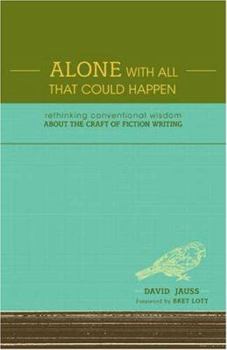Alone with All That Could Happen: Rethinking Conventional Wisdom about the Craft of Fiction
Select Format
Select Condition 
Book Overview
In a satisfying story or novel, all of the pieces seem to fit together so effortlessly, so seamlessly, that it's easy to find yourself wondering, "How on earth did the author do this?" The answer is... This description may be from another edition of this product.
Format:Hardcover
Language:English
ISBN:1582975388
ISBN13:9781582975382
Release Date:July 2008
Publisher:Writer's Digest Books
Length:256 Pages
Weight:1.18 lbs.
Dimensions:0.9" x 7.1" x 8.7"
Customer Reviews
5 ratings
A Book on Writing That Respects the Reader's Intelligence
Published by Thriftbooks.com User , 15 years ago
Some books about writing fiction read like manuals for assembling complicated, slightly dangerous devices that will take you down with them if you mess up. David Jauss understands that writing is a matter of blood, guts, and putting your neck on the line. This book isn't an ABCtarium of basics such as plot, narrative arc, genres, etc., but through careful, even reverent navigation of much-traveled technical waters, Jauss invites writers to see things in new ways and to think new thoughts about fiction writing. He is someone for whom understanding writing craft is a matter of finding heaven in a grain of sand. --What else is 'inspiration' if it isn't that?
Brilliant!
Published by Thriftbooks.com User , 15 years ago
Unlike most craft books that seem obsessed with rules and categories (that every story MUST have an epiphany, that the POV MUST be omniscient, limited, or dramatic, that you MUST write only what you know, and so on...), Jauss pursues a more nuanced (and more accurate) set of truths. By looking in great detail at many, many examples from great works he is able to talk about intangibles such as "flow" and "transcendence." This collection is very practical, and yet amazingly warm and surprisingly funny. As one of David Jauss' former students, I can say that it is second only to the man himself.
Irreplaceable Confrontations
Published by Thriftbooks.com User , 16 years ago
Others who have reviewed these essays emphasize the (stellar) technical essays in this collection, but I'd like to add that the last essay "Lever of Transcendence" is the real diamond in the collection. This essay explores and explains why some art lives and some does not. It is thus a treatise on life as well as writing. I'd predict and hope that this piece would be read and re-read by every serious reader as well as every serious writer -- and maybe the not-so-serious ones as well.
Will blow your mind with its brilliant insight! Read, then read AGAIN.
Published by Thriftbooks.com User , 16 years ago
As I commented on the other reviewer's post, I'd picked this book up and put it back several times before I saw HIS review and ended up buying it. I know I'm not alone in buying and spending too much time reading writing books instead of writing, but this purchase is justified and CRUCIAL to growth as a writer. I read the book from cover to cover in less than a week and the information is so vital, groundbreaking, and provocative, that is is NECESSARY to read it more than once. Each essay. You will be excited about going back to page one just to make sure that everything sinks in! I realize now that I put the book back a few times before buying it because it is NOT the kind of book that you can take a quick glimpse at and decide whether or not you need it. It must be read closely and carefully. Please take our word it, you will be a better writer because of it. My favorite chapters were on the point of view, epiphanies about epiphanies and putting together a story collection. This is a book for serious writers, and makes me think of my FAVORITE critic in the world Wyatt Mason (who he even references about Edward P. Jones - read Mason's essay on Jones online from Harper's at ONCE). Mason and Jauss make you proud to be writers, and make you see fiction with an even more exhilarated critical eye so you can love it as a reader and admire and absorb it as a writer. Gosh, let me stop gushing and get back to work. I put this book up there with The Art of Fiction. Timely and timeless already! Dayum! Well done, Mr. Jauss!
The Best Writing Book You Haven't Read
Published by Thriftbooks.com User , 16 years ago
The firs two essays alone in this collection are worth the price of the book. David Jauss looks at such craft issues as point of view, epiphanies, the organization of a short story collection, writing what you know, and other things. But what makes this book stand out from other writing books is David Jauss doesn't just repeat the same old tired and already well-known wisdom on such topics. Instead, Jauss gives us a whole new way of looking at it. The chapter on Point Of View is the best one. This essay looks at how point of view is more a matter of technique than a matter of denoting which person is telling the story, and Jauss goes on to talk about how multiple point of view shifts are not only okay, but in many cases, they are preferred. You won't get the same insight elsewhere. Whereas most writing books just repeat the same advice, perhaps with a thematic gimmick thrown in to make it look different, ALONE WITH ALL THAT COULD HAPPEN is a new way of looking at old writing techniques. The essays are heavy with examples from other works and quotes from other sources, making this in a way a more academic writing book than most, but the insights delivered simply should not be passed up. If you're a writer, get this book.





